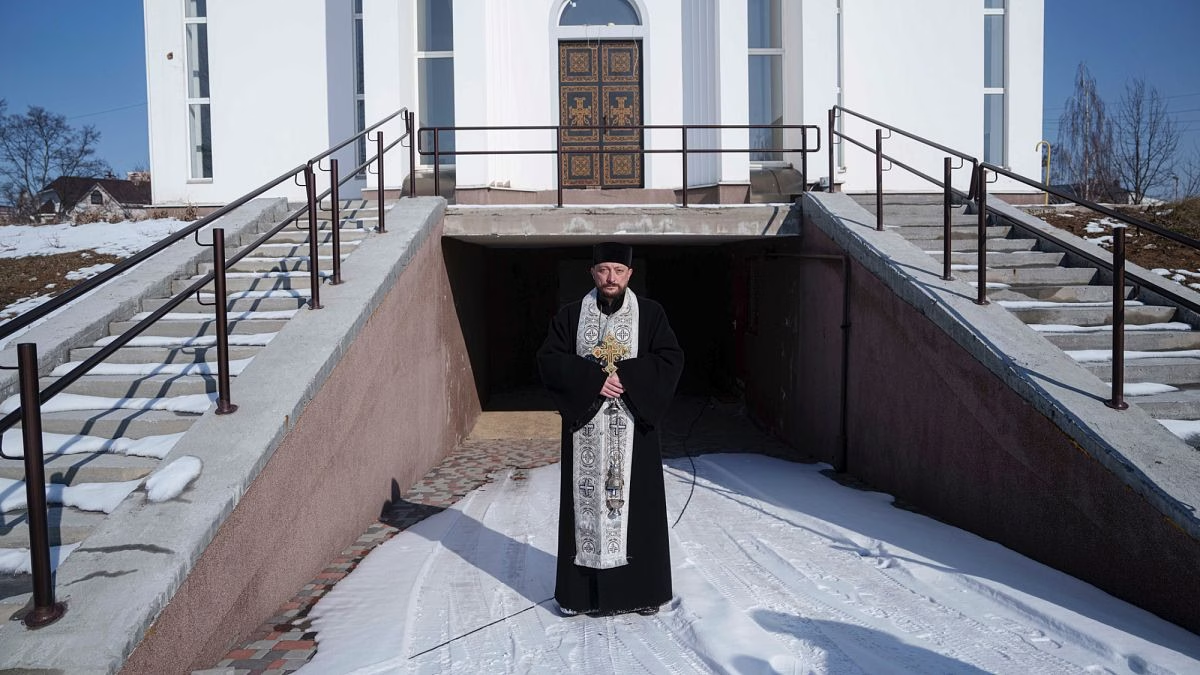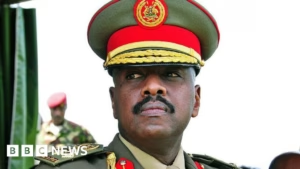Three years ago, in early March 2022, satellite images revealed the first mass grave of civilians in Bucha, a town in the Kyiv region. It was situated on the grounds of the Church of St Andrew, which now hosts the Wall of Remembrance for the civilians killed by Russian troops during the occupation.
<
div>
The priest at the Church of St Andrew, Father Andriy Halavin, remains in Bucha, three years since Russia's violent invasion of Ukraine began.
The Kyiv region and its towns, such as Bucha, Hostomel, and Irpin, were among the first to face—and halt—Russian forces in their full-scale invasion in early 2022.
<div class="c-ad c-ad-sticky-floor c-advertising-sticky-floor sales-advertising-sticky-floor u-hide-for-desktop">
<button class="c-ad__btn-close" type="button" onclick="this.parentElement.classList.add('u-hide-for-all')">
<img src="https://static.euronews.com/website/images/icons/icon-cross-10x10-grey-6.svg" width="10" height="10" alt="Close advertising" fetchpriority="high" loading="lazy"/>
</button>
</div>
Father Andriy explains that the Wall of Remembrance in Bucha will be replaced by a permanent memorial. He envisions the wall, which features metal plaques for each civilian killed after Russian troops occupied the town, as a place where people, including children, can find strength and remembrance.
“The liberation of our country started with the liberation of Bucha,” Father Andriy emphasized.
<h2><strong>Recalling 2022's Painful Memories</strong></h2>
Father Andriy is intimately familiar with every corner of Bucha and likely every resident. While showing the memorial, he points out a house across from the church.
A family that lived there had fled Russia’s war in the Donbas and sought refuge in Bucha, only to be pursued by it again. On March 5, a few days into the occupation, the family attempted to evacuate.
"Russian forces opened fire on them, on the entire family, right there in the streets of Bucha," Father Andriy recounted.
Only the father survived, having lost his leg. The names of his nine-year-old and four-year-old children, along with their mother, are engraved on the memorial at the church, right across the road from their house. The father still resides in Bucha, according to Father Andriy.
He knows the names and stories of almost everyone whose name is etched on the memorial. He explains that many families were killed while trying to evacuate.
“We have surveillance cameras at the exit from Bucha, the roundabout towards Hostomel and Irpin. On the second day of the full-scale war, the Russians shot at any moving car, and many people died there,” he stated.
Many civilians were also killed while remaining in Bucha under occupation. “When Russians entered people’s houses, they would open fire on anyone inside,” Father Andriy explained.
Residents had no choice but to leave to find food, water, and medicine. Russian soldiers told locals to wear white bands on their arms for safety, but it did not guarantee protection.
“A father and a son went to the city hall to get medicine, and both were shot. The son, thirteen years old, survived because the bullet went through the hood of his vest. He stayed on the ground next to his father's body, pretending to be dead until it was safe to return home,” the priest recounted.
<div>
<div class="c-ad c-ad-halfpage u-margin-bottom-3 u-show-for-mobile-only">
<div class="c-ad__placeholder">
<img class="c-ad__placeholder__logo" src="https://static.euronews.com/website/images/logos/logo-euronews-grey-6-180x22.svg" width="180" height="22" alt="" loading="lazy"/>
<span>ADVERTISEMENT</span>
</div>
</div>
<h2><strong>Bucha, Three Years Later</strong></h2>
The Vokzal'na Street in Bucha, famous for a photo that shocked the world showing destroyed Russian armored vehicles, looks completely different now.
There are no signs of battle, and nearly no signs of destroyed houses. The street has been rebuilt and now resembles any quiet European town, complete with modern houses and tidy fences.
Cafes and shops have been rebuilt and reopened, and people have returned. Nevertheless, the emotional wounds have not fully healed, even though physical signs of Russian brutality are mostly confined to some residential buildings with shrapnel damage.
Father Andriy states that there are 509 names on the Wall of Remembrance of civilians killed during the occupation of Bucha, emphasizing, “509 civilians died here, not as a result of combat, but during the occupation. And we haven't even talked about the other atrocities like rape, robbery, abduction of children.”
<div>
<div class="c-ad c-ad-halfpage u-margin-bottom-3 u-show-for-mobile-only">
<div class="c-ad__placeholder">
<img class="c-ad__placeholder__logo" src="https://static.euronews.com/website/images/logos/logo-euronews-grey-6-180x22.svg" width="180" height="22" alt="" loading="lazy"/>
<span>ADVERTISEMENT</span>
</div>
</div>
<h2><strong>Perspectives on Talks with Russia</strong></h2>
Among statements by former US President Donald Trump about Ukraine, one stood out and crossed red lines for the Ukrainians: when he suggested that Ukraine was to blame for starting the war.
Father Andriy believes that for the Russians, negotiations are a means to achieve through diplomacy what could not be achieved through force.
“The Russians wanted to take Kyiv in three days, but they failed. With the help of Trump and so-called negotiations, they are trying to occupy Ukraine in another way,” he explained.
"This is a matter of justice. What is concerning is that when they talk of ‘negotiations,’ no one discusses crimes or accountability."
He understands why those outside may struggle to understand, likening it to basic human psychology.
“When planes were already overhead, Russian helicopters were flying, and everything was exploding, you realize that there is war," Father Andriy said.
. “But mentally, it was impossible to accept that such a thing could be possible in the 21st century.”
Many people in Europe feel the same way, unable to accept the war's reality, Father Andriy noted.
"They are not ready to accept it. They lead calm, comfortable lives," he said, adding that now Europeans are starting to understand but are not yet ready to surrender what they had or accept the current state of affairs.
“If this continues, there is a danger that they will have to learn Russian. Because if Ukraine falls, Poland and the Baltic states will be next.”
He believes that the critical issue in any discussions with Russia is the understanding of what “peace” truly means, which varies greatly between Ukraine and Russia. Even if the conditions and terms of an agreement are favorable, will this make Russia's Vladimir Putin and his forces cease firing?
“Ukrainians understand the word ‘peace’ as not being killed, with justice, and criminals held accountable for their crimes—this is peace," Father Andriy said.
"From Putin's perspective, I think, ‘peace’ is when they stop shooting because there are no more survivors on our side, only territories left,” he concluded.
</div>
</div>





